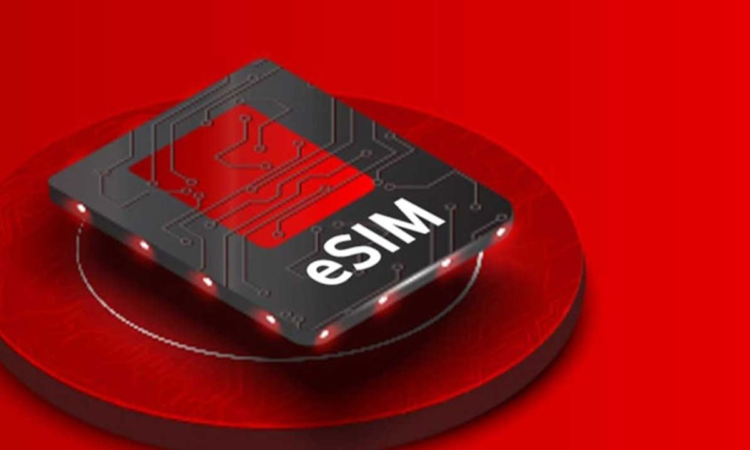eSIM and Nigeria's telecoms market expansion — Technology — The Guardian Nigeria News – Nigeria and World News – Guardian Nigeria


The evolution of eSIM, or embedded SIM card, is gradually replacing the need for a physical SIM card and slot in many mobile phones. However, as with other digital transformation exercises, the challenge is not in introducing a new technology, it is in understanding the impact that the technology will have on the users and ecosystem. ADEYEMI ADEPETUN, in this report, examines the implications of eSIM on Nigeria’s telecoms market.
Over the last three or four years the phrase ‘Digital Transformation’ has dominated the technology conversation. This umbrella term incorporates a lot of very important technology trends, including the idea that for almost all companies IT is becoming increasingly strategically important. As part of that process, legacy operational technology(OT) systems are giving way to IT, or being integrated with them.
In effect, this is what is happening with an embedded SIM card (eSIM). This means that the old plastic SIM will probably be consigned to the dustbin of technology history sometime in the next decade.
According to a White Paper on eSIM, the technology is the future, not least because it will end up being cheaper and more customers friendly. The White Paper noted that every mobile network operator (MNOs) will need to change to reflect that. It added that to truly realise the opportunities, MNOs should proactively pursue a strategy of overhauling their existing practices to reflect the new market reality.
For operators, the adoption of eSIM is inevitable. Within the next 10 years there is little doubt that the plastic replaceable SIM will become redundant. The report noted that it is not hard to envisage eSIM adoption growing dramatically to be a mass-market phenomenon by 2025.
Other reports showed that the eSIM market is expected to grow rapidly, from an estimated $253.8 million in 2018 to nearly $980 million by 2023.
The White Paper noted that the key point with eSIM is that it is not optional. It stressed that infuture millions of devices will be eSIM only. Eventually all will be eSIM-only and plastic SIM cards will be phased out.
MNOs, in recognition of both the inevitability and the opportunities of eSIM, have been increasingly active in rolling out the technology. Today, report has it that over 200 mobile network operators, including all the major global groups, support eSIM. The technology has also matured dramatically: over the last five years
eSIM has moved from being based on vendor-specific solutions deployed by individual operators, to being a global compliance framework from the GSM Association, which will allow all operators, OEMs and eSIM solutions vendors to deploy interoperable products and services.
Indeed, Nigeria is not left out in the eSIM revolution. Only last week, Airtel announced the launch of eSIM in the country. This came after MTN Nigeria and 9mobile, which were the first telecom operators approved by the Nigerian Communications Commission (NCC) to commence the trial of the service in 2020.
The benefits
There are many advantages of eSIM, not least with regards to switching phone networks. For example, if you are switching from one network to another, you don’t have to go out to a shop to get a new SIM card or wait for one to arrive in the post – you can switch there and then.
Perhaps a customer is thinking of switching to more than one network – that’s easy too. Because an eSIM lets users store more than one network in it, and are able to switch quickly between them. This could come in handy if there is no signal, in an area that thenetwork doesn’t cover. If this happens, the subscriber is stuck. But in the near future, he or she could simply switch to the network that offers the best coverage.
eSIM takes up less room on a phone than a SIM card and its tray. It could be good news for travellers too, as the user can switch to the local network/tariff wherever he or she is –therefore avoiding roaming charges.
On the other hand, checks by The Guardian showed that the pros outweigh the cons, but there are a couple of potential flaws. With a physical SIM, if your phone breaks down you can transfer the SIM and have all your details on another phone – this may not be possible with an eSIM. You may not be able to transfer data from one phone to another, except for information stored in the cloud-like contacts, messages, and more.
eSIM as a regulatory intervention in Nigeria
While the quartet of MTN, Globacom, Airtel and 9mobile have connected over 300 million SIM cards with 222 million active in the last two decades, for operators deploying the eSIM in Nigeria, they are subjected to compliance with a number of regulatory conditions.
The conditions include full compliance by the MNOs with the registration of Telecoms Subscribers Regulations 2011; the Mobile Number Portability Regulations and Business Rules2015; Guidelines on SIM Replacement 2017; and non-degradation of the Quality of Service (QoS) experience by users of e-SIMs.
The Executive Vice Chairman of NCC, Prof. Umar Garba Danbatta, had said: “The primary objective of the e-SIM trial is to assess the technical performance of the e-SIM on telecoms service providers’ network towards eventual rollout, if satisfactory.”
“An eSIM is a small chip that is embedded on a mobile phone or smart devices. It is designed for convenience, flexibility and simplicity. The e-SIM makes it easier for subscribers to choose a pre-paid plan provider and switch between network operators. The information on the e-SIM is rewritable by operators and the identification information canbe updated over time.
“The eSIM is a technology that will eliminate the need for physical SIM card slots on mobile devices in the near future, and the trial is in line with the commission’s forward-looking regulatory approach to ensure Nigeria’s telecoms ecosystem is in tandem with global best practices,” Danbatta said.
Activating eSIM on MTN, 9mobile, Airtel
eSIM is seen as the next step in the evolution of SIM cards as it is designed to deliver unprecedented freedom and flexibility. To activate an eSIM, the person needs to first have a compatible phone. Currently, eSIM-enabled phones are still limited. However, a number of the latest devices from the top mobile manufacturers are built with this capability.
Checks showed that some devices and their new models are eSIM enabled. These include Apple iPhone XS and newer models; Samsung Galaxy S-series from S20; Samsung Galaxy Note series fromNote20; Google Pixel 2 and more recent models; Samsung Galaxy Z and Galaxy Fold devices.
The activation of eSIM on the networks of MTN, 9mobile and Airtel has the same pattern. For instance, to activate an eSIM on MTN, a subscriber needs to visit any MTN store. The company’s customer care agents will check if his or her device is eligible and if eligible, the process is set up.
For 9mobile, the customer is also expected to walk into select 9Mobile Experience Centres and request eSIM activation. A QR code will be provided to scan and download an eSIM profile and perform the usual SIM registration.
Airtel also requires the customer to visit any of its Service Centres where the customer care agents will walk the intended user through the process of setting up your eSIM.
Airtel said service is now immediately available on its network and customers, who wish to switch their current physical SIM cards for eSIMs will need to ensure they have a compatible device (dial*#06#), obtain the required QR code and be guided through a SIM Swap process by an Airtel service personnel.
The telecommunications firm said it has developed a simple and flawless process to activate the eSIM service for all its customers just as it believes that the digital SIM will significantly improve the productivity of Nigerians, helping its stakeholders to achieve personal and professional goals.
It should be noted that eSIM also requires a registration like the physical SIM.
eSIM in other countries
In 2019, eSIM technology was launched in Sierra Leone through Africell. Andreas Fink, whose Ethereum-based company, Cajutel, secured a license to build an Internet company to bring high-speed Wi-Fi to Sierra Leone, said not much may change for normal end-users with the introduction of eSIMs.
He, however, added that it is vital for IoT, which may still take time to play a meaningful role in Sierra Leone’s mobile market with approximately 5.8 million users.
Industry experts have observed that slowly but surely, it looks like eSIMs will take over because they provide a new level of convenience and accessibility for everyone. As long as a carrier supports the eSIMs and a customer’s phone supports them, then that may be all a customer needs to start using the new technology today. To help bridge the gap, some phones with eSIMs still have traditional SIM card slots, but it’s a good bet that eventually, those trays could go away altogether.
Whether a customer is travelling, switching carriers, or upgrading his phone, an eSIM sounds much easier to manage than any of the alternatives. Fortunately, technology is spreading faster than consumers can keep up, and soon it’ll be everywhere.
You must be logged in to post a comment.
Why are you flagging this comment?
I disagree with this user
Targeted harassment – posted harassing comments or discussions targeting me, or encouraged others to do so
Spam – posted spam comments or discussions
Inappropriate profile – profile contains inappropriate images or text
Threatening content – posted directly threatening content
Private information – posted someone else’s personally identifiable information
Before flagging, please keep in mind that Disqus does not moderate communities. Your username will be shown to the moderator, so you should only flag this comment for one of the reasons listed above.
We will review and take appropriate action.
Get the latest news delivered straight to your inbox every day of the week. Stay informed with the Guardian’s leading coverage of Nigerian and world news, business, technology and sports.
Follow Us







